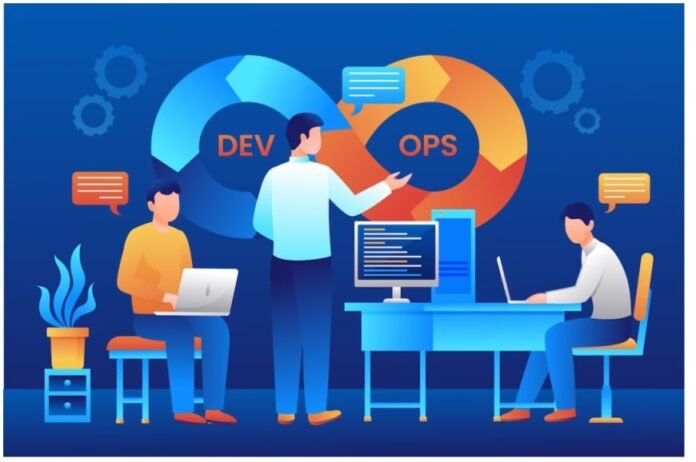DevOps Training in Chandigarh
Introduction
In the ever-evolving landscape of technology, DevOps has emerged as a transformative approach that bridges the gap between software development and IT operations.
With its emphasis on collaboration, automation, and continuous delivery, DevOps is revolutionizing how organizations deploy and manage software.
Chandigarh, a city known for its progressive infrastructure and growing tech community, is increasingly becoming a hub for DevOps training.
This article explores the essence of DevOps training in Chandigarh, whether coding is essential, the role of Python, the concept of no-code in DevOps, and whether it’s possible to learn DevOps without coding skills.
What is DevOps?
DevOps is a set of practices and cultural philosophies that aims to streamline and integrate the processes of software development (Dev) and IT operations (Ops). By fostering collaboration between development and operations teams,
DevOps seeks to enhance the efficiency of software delivery, improve product quality, and accelerate the release cycles. The core principles of DevOps include:
- Collaboration: Breaking down silos between development and operations teams to work towards common goals.
- Automation: Utilizing tools and scripts to automate repetitive tasks and processes, such as code integration, testing, and deployment.
- Continuous Integration/Continuous Deployment (CI/CD): Implementing automated pipelines for integrating and deploying code changes frequently and reliably.
- Monitoring and Feedback: Continuously monitoring applications and infrastructure to gather feedback and make iterative improvements.
DevOps is not a tool or a specific technology but rather a cultural shift and a set of practices that improve collaboration, efficiency, and quality in software delivery.
Does DevOps Need Coding?
Coding is not strictly required to work in DevOps, but it is highly beneficial. Here’s why:
Coding Skills in DevOps
- Automation Scripts: Coding is essential for writing automation scripts to streamline repetitive tasks, such as deployment and monitoring. Knowledge of scripting languages helps in creating efficient and error-free automation processes.
- Infrastructure as Code (IaC): DevOps practices often involve Infrastructure as Code, where infrastructure configurations are written and managed through code. Familiarity with coding allows for effective IaC management and automation.
- Custom Tool Development: Sometimes, DevOps professionals may need to develop custom tools or scripts to meet specific needs or integrate different systems.
Non-Coding Aspects
- Configuration Management: Tools like Ansible, Puppet, and Chef often use declarative languages, which are easier to grasp compared to traditional programming languages.
- Monitoring and Analytics: Tools like Prometheus, Grafana, and Splunk have user-friendly interfaces and dashboards that do not require extensive coding skills.
Does DevOps Require Python?
Python is not a mandatory requirement for DevOps, but it is one of the most popular and versatile languages used in the field. Here’s why Python is often associated with DevOps:
Benefits of Python in DevOps
- Scripting and Automation: Python’s simplicity and readability make it an excellent choice for writing automation scripts and tools. Its extensive libraries and frameworks can facilitate various DevOps tasks.
- Integration: Python is widely used for integrating different systems and tools, making it valuable in creating and managing complex workflows.
- Community and Libraries: Python has a robust community and a wealth of libraries and tools that can support various aspects of DevOps, from web development to data analysis.
Alternatives
While Python is beneficial, other languages and tools can be used in DevOps:
- Bash/Shell Scripting: Often used for simple automation tasks and scripting in Unix-based systems.
- Go: Known for its performance and efficiency, often used in cloud-native applications and container orchestration.
- Ruby: Used with tools like Chef for configuration management.
Is DevOps No-Code?
DevOps is not inherently no-code. While there are aspects of DevOps that can be managed with minimal or no coding, such as using graphical interfaces for configuration management or monitoring, the core principles of DevOps often involve scripting and programming.
No-Code Tools
- Pipeline Builders: Some CI/CD tools offer drag-and-drop interfaces to design pipelines without writing code.
- Configuration Management: Tools like Ansible and Puppet use declarative language, which simplifies configuration compared to traditional programming.
Coding Still Required
- Custom Automation: For complex automation tasks, coding is often necessary to create customized solutions.
- Integration and Scripting: Writing scripts to integrate different tools and systems usually involves coding.
Can I Learn DevOps Without Coding?
It is possible to learn and work in DevOps without deep coding knowledge, especially for roles that focus more on process management and tool usage. However, having a basic understanding of coding can significantly enhance your ability to contribute to DevOps practices.
Learning DevOps Without Coding
- Tool Mastery: Gain proficiency in using DevOps tools and platforms that offer user-friendly interfaces and minimal coding requirements.
- Process Understanding: Focus on understanding DevOps processes, such as CI/CD, monitoring, and configuration management, and how to implement them effectively.
- Configuration Management: Learn how to use declarative tools and frameworks that require minimal coding.
Benefits of Coding Skills
- Enhanced Automation: Coding skills allow you to write and customize scripts for automation, leading to more efficient workflows.
- Custom Solutions: Ability to develop custom tools and integrations tailored to specific needs.
- Problem Solving: Coding skills help in troubleshooting and resolving complex issues that may arise during DevOps processes.
Conclusion
DevOps is a transformative approach that combines development and operations to improve efficiency, quality, and collaboration in software delivery. While coding is not an absolute requirement for DevOps,
it plays a crucial role in automation, customization, and integration tasks. Python is a valuable tool in the DevOps toolkit but is not the only language used. DevOps encompasses both coding and no-code aspects, with various tools and practices available to suit different skill levels.
Learning DevOps training in Chandigarh offers a unique opportunity to gain practical skills and insights in a city that is rapidly becoming a tech hub. Whether you’re looking to dive deep into coding or focus on the strategic aspects of DevOps, understanding the core principles and tools will set you on a path to success in this dynamic field.
